It’s been 52 years, but John L. Hochheimer remembers where he was when he first heard an Elton John album.
Elton John was a relatively unknown musician in October 1970, just starting out with 20 shows in England under his belt and a brief initial trip to L.A. and New York. His record label decided to launch a full U.S. tour to promote his self-titled album.
And his first stop was in Boston, where very few people knew him. He will stop in Massachusetts again tonight to play a packed Gillette Stadium on what he is calling his final tour, "Farewell Yellow Brick Road."
More Music
But back in 1970, people didn't pack into stadiums to see him perform. Hochheimer, now professor emeritus of communication at Southern Illinois University, Carbondale, remembered hearing John when he was spinning records on a nightly rock-folk-blues-jazz program on WBUR called "The Other Side."
“One night, two fellows showed up saying, ‘look, we are with a new artist. This is [his] first appearance in Boston. His name is Elton John and we have his album,’” Hochheimer said.
They gave him a copy of the album and asked that he listen and maybe, if he liked some songs, play them on the radio.
“As you might well imagine, at the time, there was a constant parade of different artists and different promotion people,” Hochheimer said. “You know, everybody's going to be the next Elvis. Every band is going to be the next Beatles, blah, blah, blah.”
But this album was different.
“What I heard was so beautiful, I almost started crying,” Hochheimer said. “I got a few phone calls, basically, going, who is this guy? It's beautiful. It's not rock and roll. You know, it doesn't have a typical band: lead guitar, rhythm, guitar, bass, drums, etc. We had a harp playing, and cellos and his voice was just so crystal clear and beautiful. It's like, this guy's amazing.”
"What I heard was so beautiful, I almost started crying."-John L. Hochheimer, professor emeritus of communication at Southern Illinois University, Carbondale
John was in Boston for a couple of shows. David Bieber, now an archivist and music director at the radio station at the time, remembered heading to the Boston Tea Party Rock Club on Lansdowne Street, where the House of Blues stands today. Tickets were usually around $2.50, $3.50 or $4.50.
“Remind people that there were decimal points in there,” Bieber said of the ticket price. “I'm being generous and maybe slightly exaggerating to say that there were 60 people in the room.”
John performed in a pair of overalls with the chest pocket sewn on askew, and a long-sleeved shirt with stars printed on it underneath. That’s what he was wearing when Hochheimer met him backstage. John introduced himself as “Reg,” short for his given name, Reginald.
“I was 20 at the time, so he was like 23, 24,” Hochheimer said. “And here's this short fellow, Elton John, in a jumpsuit. If you look really closely at the picture on the cover, the glasses are fairly muted from, you know, who Elton John would become as his career advanced, as his popularity exploded, to where he went from this wonderfully talented singer and piano player to a showman.”
The crowd was relatively small and unfamiliar with John’s work, but his performance was entrancing.
“I think a lot of people, in hearing him perform were like, whoa,” Hochheimer said. “And the reaction was enthusiastic, to be sure. But of course, 35, 40 people is not like, I don't know, playing at Wembley Stadium or something like that, where tens of thousands are on their feet cheering.”
Both Hochheimer and Bieber remembered him playing “Your Song.”
“Elton was kind of just getting his sea legs in America. And the pivotal song at that point was ‘Your Song,’ the ballad,” Bieber said. “But he really ripped into a full flight. Everything that he's known for the acrobatics, the piano, the calisthenics, he just put himself into orbit, even though there were barely double digit numbers of people in the room.”
As John played, Hochheimer said, it was clear that this was someone to watch.
“There was an appreciation that this is somebody special. This is somebody,” Hochheimer said. “This is a sound that's different, but we like it. As the performance went on, I think the enthusiasm built.”
By 1974, Elton John's popularity in the U.S. had exploded with his signature loud glasses and outfits, and by then was playing to a much louder crowd at the Boston Garden.
“It’s something that you're very proud to have bragging rights, to have been in the room,” Bieber said. “The idea of seeing somebody like that in such intimate surroundings, being able to pick your position to be as close as you wanted to be, to stand to the right of him, to the left of him, you know, to get the full power and impact. It was it was just a thrilling experience.”
If he met John again today, Hochheimer said, he’d be in awe.
“I'd be one of those people saying, wow, what you've done with your career, what you've become, what your music has been to so many millions of us around the world,” Hochheimer said. “I'm just in awe of that talent. And of course, delighted that I had a tiny little role in in his path to success."










